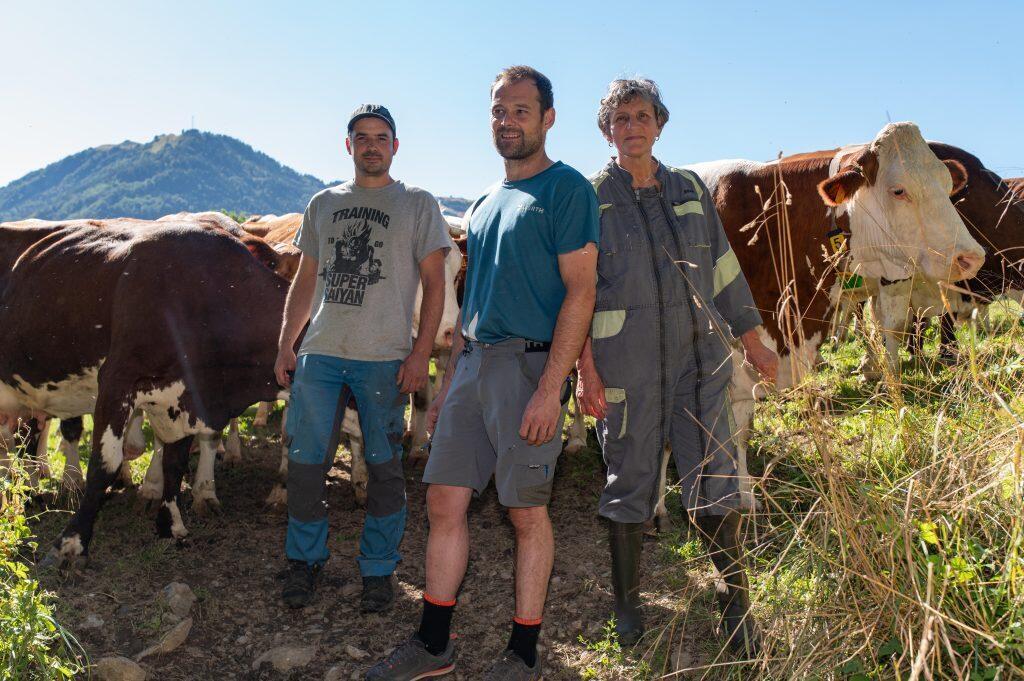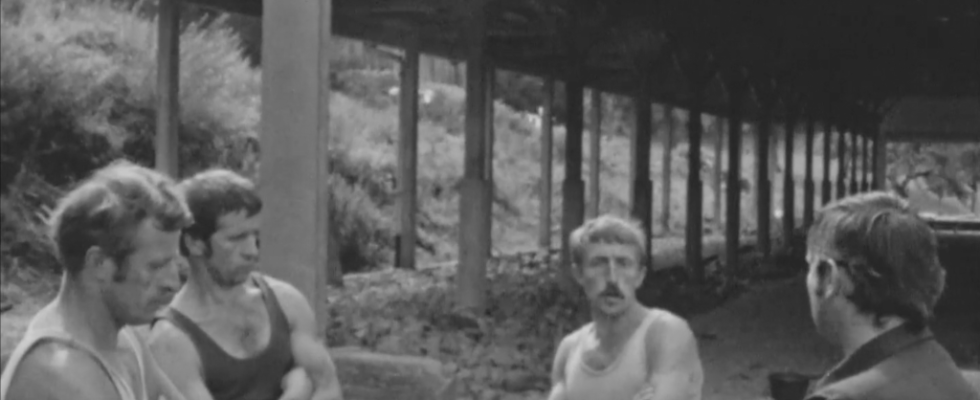This Wednesday, January 31, a film is released on French screens that is perfectly in line with social news since it tells the life and work of a family and rural dynasty in Haute-Savoie. It is the story of the transmission of heritage and know-how and its evolution. How to include a particular story in the universal narrative? “ By telling the story of my neighbors, I could tell the story of the world », explains Gilles Perret, the director. A successful bet.
Filming a family means creating a gallery of characters and the Bertrands, men and women, all generations combined, whom we accompany over several shoots and over a long slice of life, are “real” people. The Savoyard Gilles Perret therefore filmed his neighbors, those on the farm next to his parents’ house, where he still lives. A proximity that allows him to film, without being intrusive, the daily life of this family. The camera moves onto the tractor, familiarity is required, proximity is explicit, and the director’s father appears as a cider taster.
A gallery of characters
His first images were for a documentary released in 1998, “ Three brothers for one life », and the seconds for this last film. Joseph, the eldest, who knows all his “ casseroles » by their name, André « who likes company », and Jean, the silent handyman. Three brothers like the three strands of the braid, three single people who ran a dairy farm inherited from their parents. A farm that they were then preparing to pass on to their nephew Patrick and his wife Hélène.
For this last film, the three strands of the earth are the then wife, Hélène, his son Marc and his stepson, Alex. Of the three brothers, only André remains, with a broken back, but always there to take care of the chickens. To his own images, Gilles Perret added extracts from a film shot in 16mm for television in 1972 by the formidable Marcel Trillat. The program, broadcast on the regional channel, was intended for those whose lives it told. From the work of Marcel Trillat, a committed documentary filmmaker, very concerned by social changes and who has often depicted the world of work, to that of Gilles Perret, there are obvious bridges, both in the empathy of the gaze of the documentary filmmaker for his characters only in this way of starting from the local to tell the global.
The images of the past and the present mix very fluidly, with a few chronological markers. Hélène comments in voiceover on scenes from the 1998 film when she and her husband and their children were reshooting, “ lots of projects », the farm of the three brothers. His little daughters tell stories about their village and the farm. In the 1998 film, we even see the father of the three brothers, a hoary old man to whom the last of the living brothers, André, surprisingly resembles.
Modernize or disappear
You could say that the cows are part of the gallery of characters. The film opens in a milking parlor, between the four legs of an animal. Hélène, her son and her son-in-law attend the demonstration of a new milking robot. We’re talking 3D camera and 5G connection. They are seduced. We are immediately at the heart of the system: as close as possible to the daily work of these farmers and their desire, reaffirmed by all generations, to develop their work, to modernize it to alleviate its arduousness. “ Robots are replacing men everywhere, in factories, so why not in milking parlors », recognizes Hélène, especially “ it will take away a lot of difficulty at work “. A desire already affirmed in 1972 by André: “ we are enemies of mediocrity and want to seek better working conditions “.
It was either improving working conditions or abandoning the land, he assured in 1998. An equation that was that of many peasant families. At the end of the war, poverty was great, “ you had to do everything with nothing “. Hence this fierce desire to modernize the farm. The words are chosen with care and modesty. We can guess behind the confidences – no doubt shared thanks to their proximity to the director – assumed life choices, but often difficult ones, especially for veterans. For example on the impossibility of starting a family due to the rural exodus and the desertification of the countryside: we succeeded in our work, but failed in our personal life, believes André. But be careful not to confuse happiness and hardship; the elders were happier than us, André still assures us.
Transmitting knowledge and heritage
Alleviation of arduousness and the love of a job well done, these are the driving forces of their lives. The towers of the trees in the mown meadows are also cleaned: the old ones did it with a scythe, the young ones with a mechanical brush cutter, but it is necessary that “ everything is very clean », assures Marc. “ It’s so much prettier! » launched the uncle years earlier, A valorization of work and work well done which contributes to the pride of being what one is, peasant or worker. A feeling expressed by the characters in Gilles Perret’s previous films as in those of Marcel Trillat. We think of the The social Or Happy Days for the first, and to 300 days of anger for the second.
The transmission of know-how and simple knowledge, such as weather forecasting, cloud observation, the height of the mowing so as not to exhaust the soil and ensure that it maintains freshness, maturation of natural meadows so that they reseed themselves… Knowledge undermined by recent droughts and water restrictions. The quality of the hay is essential. The meadows are their green gold for these dairy farmers. Their milk is sold to cooperatives for the manufacture of the famous Reblochon, a cheese with a protected designation of origin (AOP). It must meet precise quality standards and is sold more expensive than common consumption milk.

We are in Quincy, in Haute-Savoie, on the horizon, Mont Blanc and the snow-capped peaks, it’s splendid. “ We are not here to damage nature », they all declare, especially since nature is a heritage that can be passed down. If Marc naturally took over from his father, for the other young couple, made up of his sister Élodie – the eldest daughter – and his brother-in-law Alex, “ vsit was not an easy choice », breathes the young woman. In the balance, free time and family life. Unlike their parents, young people manage to free up their evenings for their young children (who also get involved), every other Sunday and one week of vacation per year. “ It’s all good », recognizes the elder, even if they are reluctant to grab the handle of the scythe… A moving tribute to the young people who took over and voluntarily because they, the elders, did not have the choice.
On their return from Algeria, where they did their military service – which, like for many men of this generation, was the only opportunity to escape their countryside – they had to take back the farm. “ Those who left were right because they had a less painful life than ours », assured, a bit bitterly, André in 1998. But Hélène also assures that the work allowed her to stay on her feet after the premature death of her husband. “ Work saved me “, she admits. Will the children of young couples take over? They will have the choice, like their parents had.
The pressure on land is great with the expansion of towns, dormitory communities, and tourism, especially in a department like Haute-Savoie, a real “ Post card “. If we want to guarantee our food autonomy, we must preserve agricultural land, assures Marc, “ We are sawing the branch we are sitting on », an observation which echoes the concerns and demands currently being expressed. The rural world described in the film is relatively protected. The Bertrand family is more spared from the merciless laws of the market, because it is part of a “ anti-liberal model, which allows these farmers to continue their activity », notes Gille Perret. But the film has already been showing previews in the presence of the director for several months, particularly in rural France, to spark debate, at the initiative of associations or organizations such as the Mutuelle sociale agricole. In the film, Joseph says that his dream would have been to experience farms elsewhere, in other countries. The questions that the film raises and the concerns that its characters express definitely go far and proudly beyond the village of Quincy.
► The Bertrand Farm is presented in preview at the L’Arlequin cinema in Paris, with the film crew
To listen: Culture guestsFrançois Ruffin and Gilles Perret for their film “J’veux du soleil”
